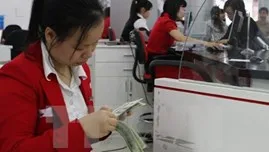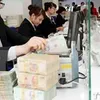Vietnam’s new exchange rate amplitude deemed appropriate

The exchange rate amplitude was increased from /- 1% to /- 2% on August 12.
With inter-bank average exchange rates at VND21,673 for US$1, the exchange rates at banks currently range from 21,240 to 22,106.
In an interview granted to the Vietnam News Agency, former head of the SBV’s Development Strategy Department Le Xuan Nghia said China’s currency devaluation is to rebalance its macro-economy and especially its state budget.
The move also benefits foreign firms since actual worker salaries will decrease in value.
China wants to rebalance its long-term current account by leaning growth on exports rather than domestic consumption, which will make their exports cheaper overseas, he added.
Its long-term goal is to maintain domestic market stability while simultaneously stimulating exports. In the meantime, China is also anticipating a recovery of global trade – currently in a slowdown trough, making the devaluation a sound solution in the long run.
Asked about the weakened yuan’s impact on the Vietnamese economy, Nghia said Vietnam’s export will be affected due to their increased value in China, but Vietnamese importers benefit from cheaper made-in-China goods, especially technology and equipment.
Nghia forecast that Vietnam’s exports would slow compared to last year, especially in agro-fisheries and petroleum.
The trade deficit between Vietnam and China is likely to widen, he warned, adding that investment flow has yet to be affected.
The global securities market plummeted following China’s big cut, to which the US may respond earlier than scheduled. If the US responds strongly, a currency war would probably occur, he cautioned.
Can Van Luc, Deputy General Director of Bank for Investment and Development of Vietnam, said regional countries have been adjusting their exchange rates in the face of China’s devaluation.
He also affirmed the SBV’s decision to widen the VND/USD trading band is a quick and appropriate response in this time, adding that the central bank’s exchange rate adjustment policy has proved effective over the past time.
To make Vietnam less affected by China’s policies, he called for drastic economic restructuring to ease reliance on Chinese imports.
Pham Thanh Ha, Deputy General Director of the Commercial Bank for Foreign Trade of Vietnam (Vietcombank), stated optimistically that with the adjustment, the foreign currency market will still operate stably and effectively.
SBV Deputy Governor Nguyen Thi Hong vowed synchronous measures and policy tools to continue stabilising the exchange rate and foreign currency market.
Tags:




